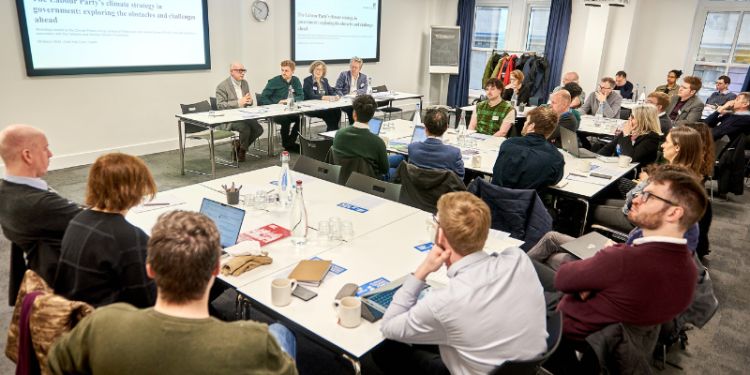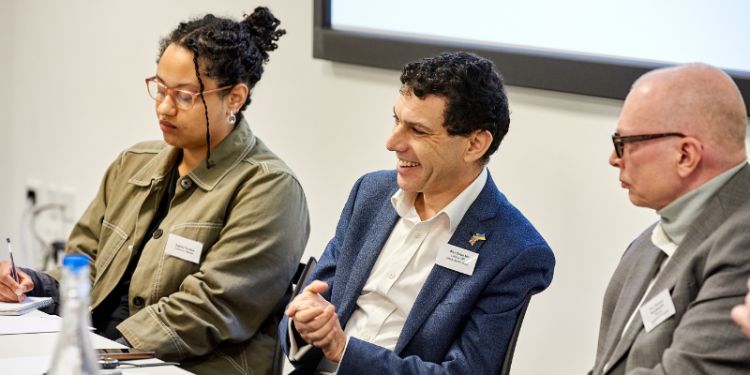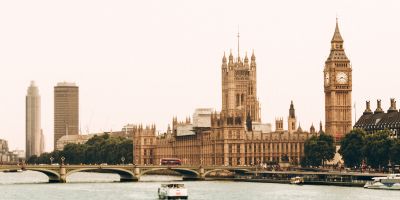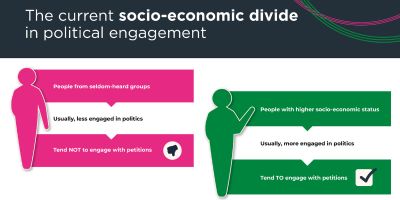Leeds academics tackle challenges facing Labour’s climate plan

School of Politics and International Studies workshop ‘The Labour Party’s climate strategy in government’ united academics and politicians to address the challenges for Labour on climate policy.
The Labour Party has set out ambitious plans on clean energy and the country’s transition to Net Zero, should it form the next UK government. Labour Leader Sir Keir Starmer and Shadow Chancellor Rachel Reeves have said that it is 'our mission to grow the economy and deliver clean power by 2030’.
What is Labour’s green agenda now?
Despite rolling back on their early promise to ramp up annual public investment in the transition to £28bn in the next parliament (as part of their Green Prosperity Plan (GPP)), Labour have maintained that they will stay ambitious around their plan to make the UK a clean energy superpower.
Their plan to bring in significant green private finance will be matched by a windfall tax on energy firms and a broader industrial strategy geared towards developing the green industries of the future, including clean steel plants, green hydrogen and energy storage.
Labour’s ‘mission’ to ‘switch on Great British Energy’ also includes creating a publicly owned renewable energy company, reforming planning rules to facilitate onshore renewables and upgrading insulation in 5 million homes.
Unpicking the challenges ahead for Labour
To understand the challenges, ‘The Labour Party’s climate strategy in government’ workshop was hosted by the School of Politics and International Studies in association with the Yorkshire & Humber Climate Committee (YHCC) on Friday 8 March at Cloth Hall Court.
Organised by academic Dr Sean McDaniel, the aim of the workshop was to bring together academic and non-academic experts, both from Leeds and beyond, to address the political, economic, social, and environmental challenges that lie ahead for a future Labour government’s climate strategy.
Attendees included academics, climate policy experts, trade unionists, think tanks and Labour representatives, including Chair of the Net Zero All Party Parliamentary Group and MP for Leeds North West Alex Sobel.
Others in attendance included Councillor Jack Hemingway (Labour Deputy Leader of Wakefield Council and a Vice-Chair of the Yorkshire and Humber Climate Commission), representatives from environmental and manufacturing organisations including Green Alliance, Natural England, Make UK and Common Wealth, Professor in Energy and Climate Policy John Barrett OBE and Professor of Comparative Employment Relations Vera Trappmann.

Photo of Alex Sobel MP and other panel members at workshop
Leeds academics drill down into the detail
The workshop was organised around three roundtable sessions focusing on the critical issues of achieving Net Zero, financing the transition, and ensuring a just and balanced transition. Chaired by Professor of International Politics and Head of School Richard Beardsworth, the first session explored the alignment of Labour’s climate programme with the UK’s target of Net Zero by 2050. The second session was chaired by Kate Lock (YHCC Policy and Communications Manager) and focused on the public and private financing of the transition to Net Zero, industrial strategy, and the support needed for UK industry to transition. The final session, chaired by Dr Mitya Pearson (University of Warwick), focused on how a future Labour government could achieve a socially just transition towards Net Zero.
Engagement with Labour has been key from the start, and we were fortunate to have Alex Sobel MP speak, as well as have a number of Labour councillors and prospective parliamentary candidates in the room.
The workshops generated a dynamic discussion on the role of public investment in the transition, the rise of anti-Net Zero populism, reducing energy demand, and the ‘greening’ of jobs, key issues that will inform Labour’s climate strategy as they approach the General Election.
What’s next?
Later this year, Sean McDaniel will be editing an issue of Renewal: a journal of social democracy, focused on the Centre-Left and the climate crisis. The issue will cover the main themes and findings from the workshop in an introduction, as well as provide space for a number of participants to develop their contributions into essays.
Also planned is a potential policy briefing based on the key themes and findings from the workshop.
We all know that climate action is urgent: the UK needs to reduce emissions, restore nature and adapt to climate risks much faster than it has so far. And this can only succeed if it goes hand in hand with reducing the shocking inequalities we see in our communities. Most people are worried about the climate and want to see more decisive leadership ‒ from all political parties.
Further Information
For any media enquiries, please contact Sally Annett, the Faculty Communications Manager for Social Sciences, via s.annett@leeds.ac.uk.




